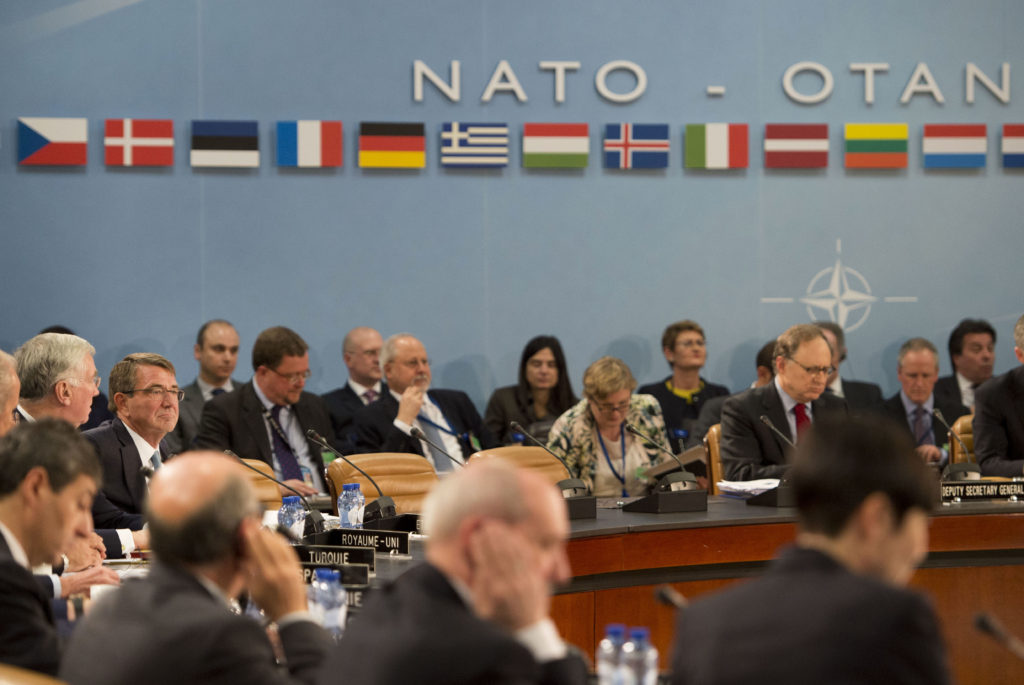Insight
June 30, 2016
Three Priorities for the NATO Warsaw Summit

The recent Brexit vote for the United Kingdom to leave the European Union challenges decades of economic and political integration. Despite the rising tide of nationalism and populism in both Europe and North America, the case for a transatlantic security alliance has never been stronger. Leaders within the North Atlantic Treaty Organization (NATO) should fortify collective security, expand alliance membership, and increase defense spending.
Introduction
NATO ministers will convene July 8-9 in Poland for the Warsaw Summit to discuss the most pressing issues facing the alliance, both internally and externally—and what to do about them. Topping NATO’s agenda this year, ministers will tackle the most salient issues in transatlantic security, including troop presence in Europe’s east, domestic defense spending, and alliance expansion.
The security situation in Europe has deteriorated significantly since the last NATO Summit in 2014. The war in Ukraine rages on in relative obscurity, and terrorist attacks throughout Europe have violated the continent’s core sense of security. European cohesion has also come under attack, with refugees flooding across borders challenging political unity and prolonged financial instability threatening economic integration. Meanwhile, the rise of nationalist movements on both sides of the Atlantic challenges the very purpose of the alliance itself.
Amidst this worsening security environment, NATO leaders have made several important decisions to meet new threats and strengthen the alliance. Now, leading up to the Warsaw Summit, NATO is on the cusp of making further progress, with unified resolve. To address the root causes of NATO’s external issues, leaders must agree on firm decisions and actions that send a clear message of unity and commitment to protect internal European security and stability.
Troop Expansion
At the end of May, NATO Secretary General Jens Stoltenberg and the President of Poland hosted a joint press conference in Warsaw. Stoltenberg addressed the importance of defense and deterrence within the alliance, reaffirming the alliance’s commitment to position more troops in Poland and the Baltics. In doing so, NATO would increase its response readiness in the region and “send a clear signal that NATO stands ready to defend any ally.”
Stoltenberg’s commitment to NATO’s troop expansion is a well-timed complement to commitments from individual member states. Earlier this year, U.S. Secretary of Defense Ash Carter requested an increase of troops in Europe, which would ultimately expand U.S. troop presence in Europe’s east from one battalion to three by next year. Soon after, the German Defense Minister announced that Germany would increase the size of its armed forces for the first time since the Cold War. German leaders decided to do so to help NATO confront Russian aggression and the rise of international terrorism.
Russian leaders have interpreted enhancements to European defense and security measures as a provocation. As such, Russia has predictably spoken out in response to many of these actions, but NATO should not balk in the face of this pressure. The transatlantic alliance should lead from a position of strength in response to Russian threats. Placing troops in defensive positions to be able to quickly respond to further Russian attacks is a clear move of deterrence—not aggression. At a time when alliance solidarity appears to be gaining momentum, NATO leaders should remain resolute to deter aggressive behavior from Russian leaders.
Defense Spending
Secretary-General Stoltenberg has recently noted a new trend in European defense spending. For the first time in nearly a decade, average overall defense spending among NATO’s European members is trending upwards. The realities of internal and external threats have led to defense and security spending changes, resulting in an average increase of 8.3 percent across Europe. Baltic states have continued steep increases of domestic defense budgets, and the United Kingdom has begun to increase its military budget after five years of consecutive defense cuts.
While this is a positive departure from previous downward trends in overall defense spending, it remains true that only four European NATO member states meet the pledge to spend 2 percent of their country’s GDP on defense. Previous AAF research has shown that if every NATO member state met the 2 percent floor for defense spending, it would mean an additional $116 billion in security spending.
While not a perfect measure, and certainly far from current budget realities, the 2 percent pledge is important as a significant symbol of commitment to NATO’s core goals and ensuring collective security. Even if all member states do not meet the 2 percent pledge, a commitment to increase defense spending represents a seriousness about threats to European security and lays the groundwork for greater cohesion across the alliance.
One effect of the rising threat level in Europe may be greater agreement among member states on the necessity of not only actions toward collective security but also increases to defense budgets at home. NATO ministers should capitalize upon this consensus at the Summit and craft a strong, unified message that domestic leaders can communicate to constituents in their respective capitals, where defense budgets are created.
Membership Invitations
Late last year, NATO invited Montenegro to begin final accession talks to become a member of the alliance. After Montenegro signed the NATO Accession Protocol in May, it became possible that membership could be approved at the Warsaw Summit. Vice President originally Joe Biden expressed support in a call congratulating the Montenegrin Prime Minister, emphasizing the significance of future expansion and the possibility of the country’s inclusion in NATO. The Obama administration, however, needs to agree on a coherent message about NATO expansion. Shortly before the Accession Protocol, U.S. Ambassador to NATO Douglas E. Lute flatly stated that there would be little chance for NATO expansion in the coming years. Next month in Warsaw, the United States should stand strong within NATO as an advocate for membership expansion.
Integrating Montenegro into NATO would be historically and geopolitically significant, bringing the Balkan country into an alliance that values democracy, cooperation, peace, and transparency. Russia has already said NATO expansion in Europe’s east is a threat to its own security and that Montenegrin membership would provoke a response. In the past, Russia has opposed stronger ties between NATO and states within the former Soviet sphere of influence, like Ukraine and Georgia. For the most part, NATO member states have obliged and tempered relations with these countries, so as to not disrupt precarious relations between Russia and the West. Most arguments against further NATO expansion center around Russia’s expected response.
While the alliance should not ignore geopolitical issues, it also should not allow Russian threats to dictate the policy choices when it comes to European security. In June, the Georgian Defense Minister spoke on a panel at the Atlantic Council about the egregious error of this perspective. Decisions motivated by fear will lead to bad policies. Rather than fearing how Russia will respond to membership expansion, NATO leaders should prioritize the alliance and its security.
By expanding NATO membership to countries like Montenegro and Georgia, the alliance secures strategic partnerships with countries that have already shown their commitment to collective security. Expanding membership would also send a signal to Russian leaders about the unified resolve of the alliance and welcome the countries into the community of democratic, transparent, and free NATO nations.
The transatlantic alliance is not itself a threat to Russia, and its expansion is not a provocation. NATO leaders must not give in to Russian rhetoric on this point. The goal of NATO membership is to lessen the likelihood of war, to multiply the effectiveness of collective security efforts, and to respond to any attacks on fellow member states. While the alliance must weigh its ability to effectively respond to security needs of its potential members, it should not bend to protestations of a fear-mongering Russian state that will continue to exploit weakness until met with a resolute alliance.
Conclusion
The economic and political disintegration between the United Kingdom and Europe is sure to have broader geopolitical effects on both sides of the Atlantic. That fact only reinforces the need for North American and European leaders to recommit to the strength of the transatlantic security alliance at this summer’s Warsaw Summit. In this effort, American leadership is imperative.










